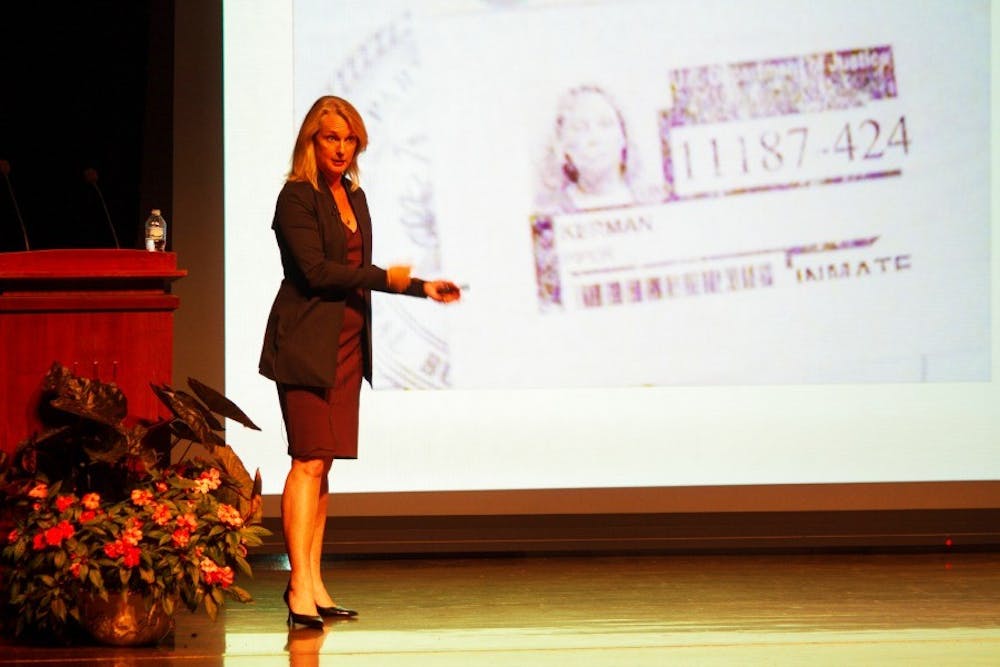Piper Kerman, Photo by Phill Arndt
The following piece, written by the editorial editors, reflects the majority opinion of the editorial board.
After serving 13 months in a women's prison, Piper Kerman knew she had to do something. From the simple act of obtaining a toothbrush to the challenges of purely surviving day-to-day, Kerman was shaken by what life was truly like behind bars. There was so much she hadn't known about and she was guessing the world didn't know either. So, she began writing. And when her writing turned into a book, she hoped for at least a small amount of readers.
"I hoped to get somebody to read about prison who would not otherwise read about prison," Kerman said. "I wanted people to think about who is in prison. Why are they there? What did they really do? Is it what we expect? What really happens behind those walls?"
In her book, Kerman highlights the far-reaching flaws in the criminal justice system, the fight to decriminalize drug use, the harsh conditions under which prisoners are held and the spike in the recent number of incarcerated women.
All these talking points are significant and central to Kerman's experience, but they probably weren't the main reason why students packed into Kerman's lecture on Miami's campus this week.
More like it, many students probably had their eyes set on a photo-op with the real-life version of one of their favorite TV characters.
The more overarching themes in Kerman's speech don't often gain mass appeal from college students. But since many are "addicted to" and "obsessed with" the series Orange is the New Black, seats were full and tickets were sold out. How many students would've been sitting in Hall Auditorium if not for the powers of Netflix?
In this era of consumer culture and easily accessible media, The Editorial Board wonders if students are really taking a moment to pause. If they are taking in the more serious themes and subject matters of what they're binge-watching or if students are mindlessly hitting "next episode."
Orange is the New Black brings attention to real issues, whether students are noticing or not. And it serves as a platform in one respect. Underneath its entertainment value and dramatic sugarcoating, it shines a light on something the majority of Americans often leave lurking in the shadows.
"Prison holds this fascination for us, and that makes sense -- of course, the world of prison and jails is very intentionally hidden away from the public view," Piper said in her lecture.
Is this what the thousands of Miami students were thinking as they tweeted quotes from the lecture and posted filtered photos of Kerman? Or were they simply interested in a celebrity sighting?
As students, we consume this kind of television and don't always see it as reality. Whether it's Law and Order, Breaking Bad or Modern Family, we are so conditioned to see anything in the realm of television as made-up. But when we walk away, we are left with some sort of takeaway on one level or another.
Of course, Orange is the New Black was in no way made to be a documentary or strictly for education. But it was rooted in a real story and it has the power to bring up real conversations. We may see it as an escape from our own daily life and as an outlet to laugh and be hooked on something, but if Kerman's talk is any indication, it has the power to be much more.
But is this the proper treatment of Piper's story? Or is her original message and purpose getting lost? Don't we owe it to the harshness of her time in prison to not just sit back and watch Orange is the New Black without at least thinking about the realness?
Because of this show, more students were sitting in a lecture and hearing about serious issues with the criminal justice system- and that, in our opinion, is a positive thing. There is clearly some good coming from this show beyond its entertainment purposes, and we hope the majority of viewers are truly taking that in.
When we're watching this kind of show, we're soaking in its messages and we're subconsciously being embedded with a new perspective. We are being affected, shaped, molded and refined to think differently about some facet of life. So, wouldn't be smart to have an "Orange is the New Black" kind of approach to all the media we consume? We're not saying that we should all start taking notes during episodes of Scandal, but it might a good idea if we start paying more attention to how it makes us think.

